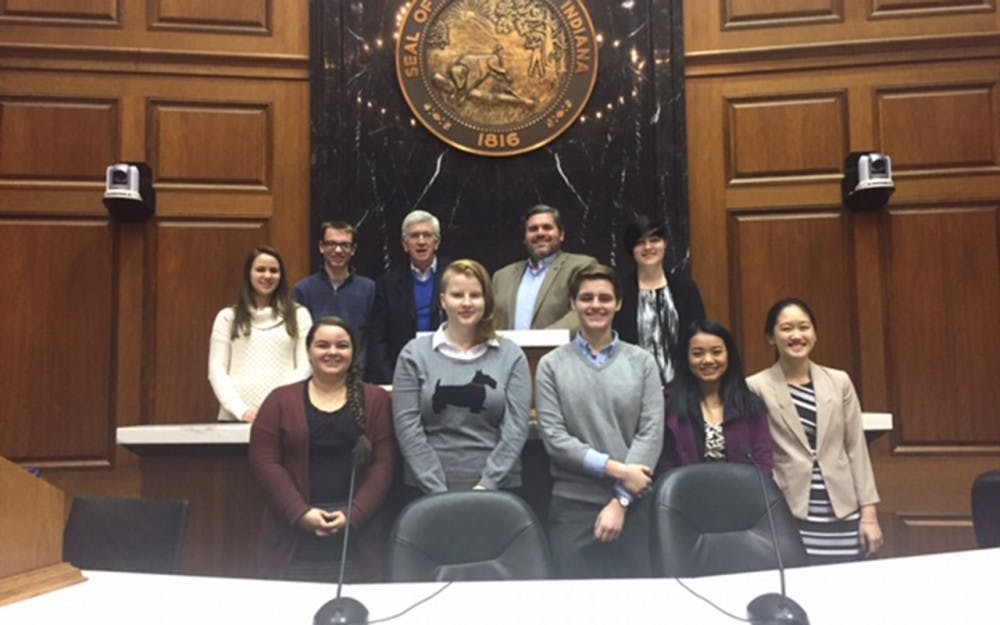Diana Hadley was teaching high school journalism when the Supreme Court of the United States dealt a crushing blow to student reporters around the country.
She said she remembers clearly when the decision came down in 1988. Hazelwood School District v. Kuhlmeier, a landmark case for student press freedoms, gave school administrators the ability to censor articles before they ran in student publications.
She was fortunate because she had a good relationship with the principal where she taught. After the news broke, he told her, “you tell your kids it’s business as usual at Mooresville High School.”
Her students were safe from excessive censorship, but other students aren’t as lucky.

Hadley, who’s now the director of the Indiana High School Press Association, was involved in a movement for a similar bill in the 1990s. This bill passed through the House but stalled in the Senate, and it’s been stalling ever since. Hadley said she expected to try to get another bill through again at some point, but it’s taken until now partially because campaigners realized they had some relationship-building to do with school administrators before the bill could be successful.
“It kind of seems like the wind’s at our back,” Hadley said. “There seems to be a movement to give students more voice.”
To get the ball rolling again, Hadley helped spearhead a grassroots campaign last summer called New Voices of Indiana. The group is part of the national movement New Voices USA, which has promoted bills like HB 1130 in several states around the country.
As momentum grew in the campaign, Hadley said Clere contacted the group to announce his enthusiastic support.
DeLaney said he signed on to the idea because he’d been a libel lawyer for many years, and one of his cases in particular stuck out to him. A high school press advisor was in jeopardy of losing his job but not because of a risqué topic. DeLaney said he recalls the story was some sort of commentary on the adviser’s school district.
Sometimes administrators don’t trust students to not go off the rails in their publications, and there is a fear of allowing inexperienced reporters to cover “sex and crime and rock and roll,” DeLaney said.
Oftentimes, though, that’s not the whole of the opposition.
“There’s also this side point that the boss doesn’t want to be reported on or subjected to criticism,” DeLaney said.
The bill hasn’t been given a committee hearing date yet, to his knowledge, but DeLaney said the odds it’ll be heard are good due to strong public support.
Clere and DeLaney wanted to get students involved in the legislative process, so they championed Hadley to find some. She reached out to advisors around the state, and students applied to be a part of the team. Five high schoolers and five college students were selected.
Selena Qian, editor-in-chief of the quarterly publication Acumen at Carmel High School, was one of the five high school students chosen. The students met with the representatives in December after the preliminary bill draft was created and made suggestions and edits, she said.
Qian said this bill is important because it would put more responsibility in the hands of student journalists, make them accountable and increase their legitimacy in the eyes of others.
“It sort of says that we trust students to make the right decision and to learn to do journalism in a way that you’re responsible for what you put out there,” Qian said. “You don’t have somebody hovering over your shoulder making sure nothing creates waves.”
Qian said students at Carmel are very fortunate the administration is supportive of their work, but that doesn’t mean journalists there haven’t had experiences encountering people who think they shouldn’t cover controversial topics.
If she attended a high school with more press censorship, such as prior review, Qian said her perception of journalism would be different. She might not have even gotten into the program in the first place, she said. She wouldn’t want to risk working hard on a story only to be told it wasn’t allowed to see the light of day.
Qian’s adviser, Jim Streisel, said it’s important for students to learn at an early age how to cover tough topics. When he teaches journalism workshops during the summer, he said he sees students who will dismiss topics offhand because they’re afraid of ruffling feathers. That’ll never fly, they say.
When students aren’t allowed to make choices about their coverage, they can’t learn good reporting practice or news judgment, he said.
“When you take that responsibility out of their hands, that’s where bad journalism happens,” Streisel said. “They don’t care about what they’re saying because it’s not in their hands anymore.”
There’s so much disparity of press freedom levels from district to district across the state, Streisel said.
Even though most of his students don’t end up continuing their journalistic careers in college, learning news judgement is an invaluable skill, he said.
“This is really a step in a long process of making sure students understand what it means to be a responsible citizen,” Streisel said. “Its job is not to tell us how to think. The job of media is to say ‘hey, here’s something you maybe haven’t thought about before.’”




